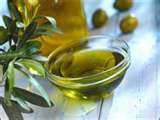 |

When I talk about consuming olive oil whether it is for medicinal, health, or just pleasure in cooking, I am almost always asked this question; "Can I cook with olive oil?" The answer is "Yes! But..."
Only Virgin Olive Oil can be used for cooking.

Extra Virgin Olive Oil cannot be used for cooking.
Before I continue, let me give a simple description of what the two oils are.
 |
EXTRA VIRIN OLIVE OIL
Extra Virgin Olive Oil is the first and maybe the second extract of oil from the olive fruits. However, this alone does not necessarily classify the oil as extra virgin. More importantly, the free acid content and the peroxide level are the determinants of the particular grade.
In the case of olive oil the free acid is in the form of free oleic acid. The lower the content of these two elements, the better the oil. Only oils with anything less than 0.8% free oleic acid content can be classified as Extra Virgin.
Peroxide levels should be less than 10mg 02/kg. Most olive oil producers don't print this information on their labels, but Laleli does and that's why I love them!

Good Extra Virgin Olive Oil is distinctly greenish in colour and has a very fruity aroma. The oil tastes smooth and full of body. It's best to keep it in dark bottles in the cupboard to reduce oxidation from occurring.
VIRGIN OLIVE OIL
 |
| Laleli Virgin Olive Oil for cooking. RM43 per 1 litre bottle. |

Virgin Olive Oil to be classified so must contain not more than 3.3% free oleic acid. This oil would be slightly less greenish in colour and less aromatic.
In both cases, the extraction must only be done by mechanical methods without any addition of chemicals or any other types/grades of oils.
 |

There are also lesser grades of oil which are labelled as "Olive Oil", "Pure Olive Oil", "Light Olive Oil" which are oils that have gone through a fine filtration processs, and "Pomace Oil " (leftover pulp of olives).
 |
Extra Virgin Olive Oil cannot be used for cooking because heat causes carbon particles to be formed and this is hazardous to the health. The best way to add it to your food is to pour it over cooked food.

It's best to use Virgin Olive oil for cooking. In fact it's so good that you can re-use it up to three times in frying, especially for fish. The Laleli Virgin Olive oil for cooking can be used up to five times! There is oil exchange between the fish and the oil, particularly Omega-3 from the fish to the oil and Omega-6 from the oil to the fish. This is really amazing! This makes the fish more easily digestible besides making the oil richer in Omega fats.
 Love your life, love your olive oil, the oil of life!
Love your life, love your olive oil, the oil of life!
Aniza Zain Ahmed

Sistem An Nisaa
2A-1 Jalan Teknologi 3/6C, Sunsuria The Core, 47810 Petaling Jaya
013- 62 60 369
Sistem rawatan lengkap & integratif:
Ayat Quran * Mandi * Bekam * Urut * Makanan Sunnah


